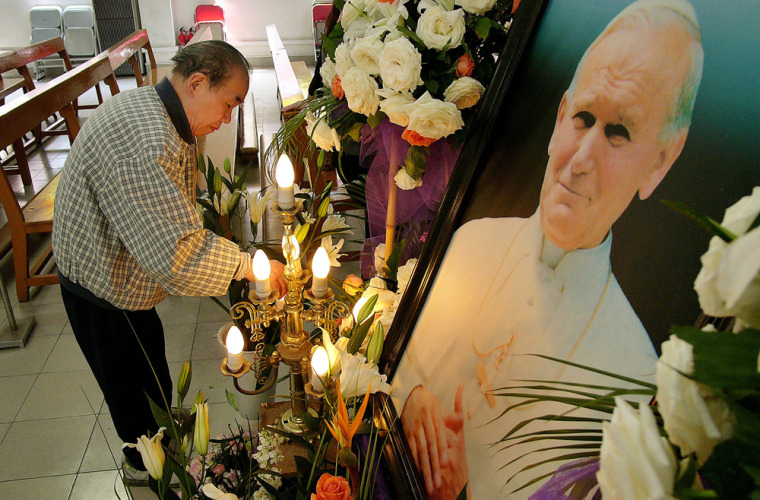There are still serious diplomatic hurdles ahead, but there's renewed hope among China's Catholics that the massive outpouring of grief for the late Pope John Paul II will provide momentum for talks leading to a normalization of ties between the Vatican and Beijing.
"The day will certainly come when we can register our church," said Father Paul during a recent midnight clandestine meeting. "And when that day comes, we will invite you to witness and report on the historic event," he added.
Father Paul spoke on the condition of anonymity in northern China last week after successfully organizing some 500 followers of an "underground" Roman Catholic Church in an open-air Mass and procession to mourn the passing of the late pontiff.
The very public event, attended by villagers of all ages and led by priests and nuns in typical Roman Catholic garbs, was punctuated by fireworks as a traditional Chinese way of mourning the dead. It was a rare and defiant show of veneration for the pope, a gesture which is technically illegal under China's current rules on religious activities.
Severed ties
China and the Holy See severed diplomatic relations in 1951 after Beijing expelled the last Vatican ambassador who then fled to Taiwan, in the wake of the communist revolution. The Vatican has continued to recognize the rival regime in Taiwan ever since.
Though Catholics were hounded as "anti-government" and "imperialist agents" in the 50s and 60s, there was a relative relaxation on religious worship with the advent of Deng Xiaoping's reform program in the 80s.
Still, the faithful are only allowed to congregate in state-sanctioned churches, led by China's Patriotic Catholic Church, which has no official ties with the Vatican.
China's Roman Catholics, who recognize the pope's authority, typically worship in so-called underground churches, which are targets of periodic police crackdowns.
There are some 5.3 million registered followers of the Patriotic Catholic Church, while the Vatican estimates that some 10 million believers worship in underground house churches that uphold the pope's authority.
In the absence of ties, Beijing has named more than 130 bishops and hundreds of priests without the Vatican's approval. In turn, the Vatican has canonized more than a hundred Chinese Catholic martyrs over the objection of Beijing, and may even have appointed one cardinal for China.
Blurred lines
For once, however, the death of the hugely popular Pope John Paul II blurred the distinction between the two groups as China's government, together with the Patriotic Catholic Church, publicly issued messages of condolences, coupled with hopes for "improved ties" with the Vatican.
"The pope was our spiritual leader," Sister Teresa Yu declared to NBC News after learning of the pope's demise, an unlikely public comment until recently, as she belonged to the state-recognized South Cathedral of Beijing.
All over China, tens of thousands of Catholics attended services in official churches. "Our pope loved China and loved the Chinese church," Bishop Aloysius Jin Luxian told a memorial Mass at Shanghai's St. Ignatius Cathedral last Saturday.
"He hoped the Chinese Church would be united and not divided," he added.
In a statement last week, China's Foreign Ministry declared a willingness to restore ties with the Vatican, on the condition that it break ties with Taiwan and uphold "non-interference" in China's internal affairs.
Willing to sacrifice Taiwan?
Bishop Joseph Zen, a frequent critic of China and head of Hong Kong's Catholic Church, which is free of Beijing's control, stirred up hopeful speculation by declaring that the Vatican is willing to sacrifice Taiwan and restore ties with Beijing to better protect the rights of the church on the mainland.
But he indicated that one sticking point would be reconciling China's demand for "non-interference" with the Vatican's authority to name Catholic bishops in China.
Some experts referred to the so-called "Vietnam formula,” whereby the Vatican would come out with a list of three people, for example, from which the Chinese government could select a bishop.
But negotiations in the 1990s broke down, as both China and the Vatican insisted on having the last word, according to Richard Madsen, expert of Chinese religious affairs at the University of California in San Diego.
Not a top priority, but faithful remain determined
A sign that perhaps China is in no hurry to allow the expansion of the Vatican's influence was an official blanket news blackout throughout China of the pope's funeral, which was witnessed by hundreds of millions around the world and attended by the world's top leaders.
"Restoring ties with the Vatican is not among the top priorities of China's leaders at present,” said a Chinese analyst who requested anonymity.
"Stability and economic development remain the focus," he said, noting that unofficial religious activities, along with terrorism and Taiwanese secessionist forces, have been cited by China's leaders among the "10 major factors of instability" that could threaten Communist rule.
But, Roman Catholics such as Father Paul remain steadfast.
"The situation still remains dangerous," he said. "After our public Mass and procession, police cars with sirens were all over our place," he added.
"Please do not disclose the event's exact location," he said.
"We are not afraid of jail, our fate is already determined, but we want our mission here to continue," Father Paul explained.
